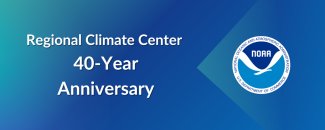The RCCs mark four decades of providing climate information from six regions across the United States

NOAA NCEI and the Regional Climate Centers (RCCs) are celebrating a 40-year partnership focused on U.S. climate and impact information!
“NCEI celebrates our 40 years of partnership with the Regional Climate Centers and their support of NOAA's Strategic Goal of building a climate-ready nation,” said Deke Arndt, the Director of NCEI. “The RCCs make NCEI and NOAA better by extending the reach of NOAA data and information into communities they know and serve so well. They ensure more equitable use of our information across all segments of the American public.”
Founded in 1983, the RCCs formed in response to the National Climate Program Act of 1977–78, which recognized the need to expand access to climate data and provide accurate, region-specific information. By 1990, six NOAA-backed RCCs were in existence covering all regions of the United States. See the detailed timeline of the RCC program’s information from the Southern Regional Climate Center.
Accomplishments and Goals
Each of the six RCCs covers a different scope of information and data based on the climate variabilities of their respective regions.
The RCCs inform the management of waterways, planting dates for crops, shipping charges for barges and trucks, and the management of drought and natural resources. Without drought and planting date data, farmers wouldn’t be able to navigate their growing seasons. Many of these resources benefit general data users as well. A growing amount of information is available for the home gardener—along with information pertaining to weather outlooks for each region, among other data topics.
All of these accomplishments are noteworthy and provide vital resources for each region.
Building a Climate-Ready Nation
NOAA continues to prioritize climate information and services in conjunction with the Regional Climate Centers. Due to the U.S. Department of Commerce’s Strategic Plan for the 2022–26 fiscal year, climate initiatives can continue with a larger budget and therefore more ambitious initiatives.
One of NOAA’s fundamental goals is to become the primary federal provider of climate information and services in order to create a Climate-Ready Nation.
The NOAA Strategic Plan notes that NOAA’s objectives are focused on ensuring that “world-class science, observations and forecasts help the U.S. lead the world toward a clean-energy future that will create millions of good-paying jobs.” This vision, along with the goal of creating a Blue Economy, works hand-in-hand with the services that the RCCs provide—it’s one of the many reasons this partnership is so successful.
RCCs: History Has Its Eyes on You
Since the RCCs’ formation 40 years ago, they have been on a journeyed path towards fulfilling their goals—they continue to create tools that represent the large scope of environmental data. Along the way, they’ve also created dashboards, outlooks, and other data visualization to streamline data delivery to every user and make it as accessible as possible.
Their data isn’t only accessible—it’s also collectively gathered with other forerunners of environmental data. The RCCs’ partners deliver climate resources at the state, regional, and national level. Their outreach includes but is not limited to the National Weather Service and the American Association of State Climatologists. Data from other organizations also provide perspective and relevance, which assists in the creation of publicly available resources.
Responsibilities
The RCCs’ main responsibility is to the public. Their goal of free, accessible, user-friendly data allows their mission to continue to move forward and expand.
In addition to other services, the RCCs provide outlooks, reports, and assessments for the monthly State of the Climate reports, the weekly U.S. Drought Monitor (USDM) updates, quarterly assessments for Drought.gov, ThreadEx, and the Drought Early Warning System (DEWS) on an as-needed basis.
Reliable Regional Resources
The RCCs present climate insight in a concise way to alleviate concerns about misinformation. Having data in one place and working with a network of reliable science agencies helps ensure that data to the public only represents the most reliable information.
Learn About the Six Regional Climate Centers Locations
- Western Regional Climate Center (WRCC)—headquarters located in Reno, Nevada
- High Plains Regional Climate Center (HPRCC)—headquarters in Lincoln, Nebraska
- Southern Regional Climate Center (SRCC)—headquarters in College Station, Texas
- Midwestern Regional Climate Center (MRCC)—headquarters in West Lafayette, Indiana
- Southeast Regional Climate Center (SERCC)—headquarters in Chapel Hill, North Carolina
- Northeast Regional Climate Center (NRCC)—headquarters in Ithaca, New York
The RCCs are releasing four news stories this year to highlight their broadscale achievements and storied history throughout the years. The first one focused on the history of the RCCs and was published on May 1, 2023. Three upcoming stories will be about their partnerships and sectors, their Applied Climate Information System (ACIS), and user engagement success stories, respectively. Links will be added as the information becomes available.
We’re proud to be partnered with the Regional Climate Centers and celebrate their vast spectrum of climate accomplishments




